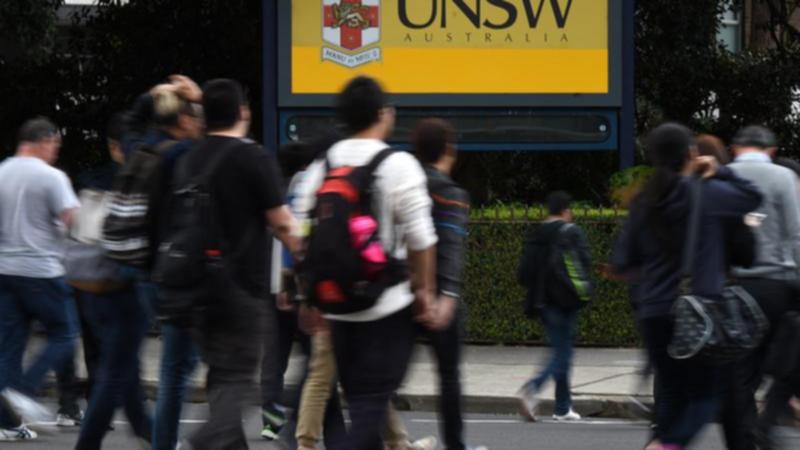Jason Clare unveils plans to make international education sector ‘sustainable’ through new caps
The federal government will slash international student numbers in a bid to return numbers to pre-pandemic levels and make the sector ‘more sustainable’.

The federal government will seek to slash international student numbers to 270,000 in 2025 and scrap a controversial ministerial direction in a bid to make the sector “more sustainable”, with major universities likely to bear the brunt.
The overall number of new international students next year will be about the same as in 2023, but under the reforms, students would be more evenly spread across the cities and regions.
Subject to parliament passing legislation, the National Planning Level will allow up to 145,000 international students to begin their studies at publicly funded universities in 2025, up 15 per cent from before the pandemic. A further 95,000 can commence vocational courses, about 20 per cent less than pre-pandemic levels.
Sign up to The Nightly's newsletters.
Get the first look at the digital newspaper, curated daily stories and breaking headlines delivered to your inbox.
By continuing you agree to our Terms and Privacy Policy.Private higher education providers will be capped at 30,000.
Education Minister Jason Clare would not reveal specific university caps on Tuesday, but said the reforms would ensure a “better and fairer” education system, with regional universities to be “the big winners”.
Australia’s largest universities are set to be the most affected.
The new caps will also replace ministerial direction 107, which was put in place by former home affairs minister Clare O’Neil in December to prioritise students applying to low-risk institutions and had largely been criticised by the sector.
“Some of the small universities, some universities that have been hit hard, by ministerial direction 107 will be higher next year than it is this year,” Mr Clare said.
“It’s designed to build a better and fairer system. The fact is universities I mentioned like Newcastle and Wollongong, like Griffith, Charles Darwin, Latrobe, are the sort of universities that have borne the brunt of ministerial direction 107, the sort of universities that will benefit from building a better and fairer way of setting levels for universities.
“They will make their individual decisions about what it means for their budgets … For some of our big universities, they have a lot more students in their universities this year than last year. One of the reasons for that, not exclusively, but one of the reasons for that is the way ministerial direction 107 has operated.”
The government flagged earlier this year that capping international student numbers would be a key mechanism in halving net migration from 520,000 in 2023 to 260,000 by mid-next year.
Universities Australia chair David Lloyd said the proposed student cap would “apply a handbrake to Australia’s second biggest export industry”.
“Curtailing growth in the $48bn international education sector risks our nation’s ambition and the university sector’s ability to support the delivery of national priorities,” he said.
“International student fees help drive Australia’s economy and support universities to operate, making up a shortfall in government funding for research, teaching and campus infrastructure.
“We’ll be working closely with our members on the details of what’s been announced today and the impact on their individual institutions as we push for the certainty, stability and growth our sector and the nation needs to secure a productive and prosperous future.”
The Coalition welcomed the idea of an international student cap, but slammed Labor for creating a “mess” in the first place.
“Today’s announcement on international student caps is the result of Labor’s immigration mess which has placed unprecedented cost-of-living and housing pressures on Australians,” education spokeswoman Sarah Henderson said.
“This mismanagement of one of our most important exports is a mess of Labor’s own making and it’s taken far too long for Labor to wake up.”
Greens higher education spokeswoman Mehreen Faruqi said Labor’s announcement had “arrogantly ignored the near unanimous opposition from the sector”.
“Today is a bad day for university independence, student choice and, of course, for international students wishing to study in Australia,” she said.
“The Government needs to stop micromanaging universities and start funding them properly.”
Asked whether the new caps would impact universities’ bottom lines, Mr Clare said: “They will make their individual decisions about what it means for their budgets and who they employ and how many students, based on these levels.”
Mr Clare said the caps were part of a broader effort to protect international education from “the shonks and crooks who try to exploit it”.
“We are implementing reforms to tackle that including most recently the shutting down of more than 150 dormant or both colleges, places that are not really operating to provide an education for international students but really are a backdoor for people to work here,” Mr Clare said.
Mr Clare said his department will write to universities across the country this week to give them their individual indicative levels, but noted the big winners would be regional universities.
“Let me reiterate, international education is extremely important. These reforms are designed to make it better and fairer and set it up on a more sustainable footing going forward,” Mr Clare said.

